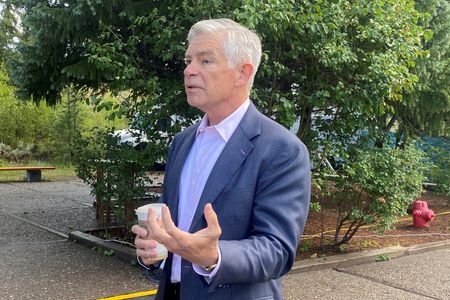By Michael S. Derby
NEW YORK (Reuters) – Philadelphia Federal Reserve President Patrick Harker said on Friday the surprisingly strong jobs data reported last week did not alter his view that moving to smaller interest rate rises was a good strategy for the U.S. central bank, as he flagged the prospect of rate cuts in 2024 should inflation continue to ease.
“What is driving our rate increases right now is inflation, and we are starting to see signs, early signs that inflation is starting to move down,” Harker said in a Reuters interview.
“At this point, we can go at a pace of 25 (basis-point rate hikes) and get inflation under control without doing undue damage to the labor market,” he said, adding that moving to smaller rate increases is a “risk management” issue for the Fed.
The U.S. central bank, which delivered a series of 75-basis-point and 50-basis-point rate hikes last year in an effort to bring inflation back down to its 2% target, announced a smaller quarter-percentage-point increase last week. The Fed’s benchmark overnight interest rate is now in the 4.50%-4.75% range.
That increase in borrowing costs was followed just a couple of days later by an employment report showing a gain of 517,000 jobs in January, nearly three times the forecast of analysts polled by Reuters. The jobs data raised questions as to whether the 25-basis-point hike was the right move, and whether the labor market’s resiliency in the face of stiff monetary policy tightening might cause the Fed to be more aggressive over time.
Fed officials hope their rate rises will better balance supply and what they see as overly strong levels of demand in the economy, and they expect unemployment to rise as part of this process from its current ultra-low level of 3.4%.
Harker, a voting member of the rate-setting Federal Open Market Committee this year, said he would still have opted for a 25-basis-point hike last week even if he had seen the jobs report ahead of the policy decision.
Other central bank officials have defended the size of the recent rate rise, but Fed Chair Jerome Powell noted in an appearance on Tuesday that if jobs and inflation data stay hot “it may well be the case we have to do more” with rate rises over time.
Inflation by the Fed’s preferred measure was running at more than double the 2% target in December.
DOOR OPENING
In the interview, Harker said he sees the Fed’s policy rate going up to somewhere above 5% and holding there for a while.
But after that, with inflation on track to ease and head back to 2% over the next couple of years, Harker said the door would open to the possibility of the Fed cutting rates at some point, simply to keep monetary policy from becoming more restrictive of economic activity.
“I don’t think that’ll happen this year,” but in 2024 “we could start to see” movement downward in the federal funds rate that will likely be gradual in nature, Harker said.
He reiterated that he doesn’t believe the economy is on track to fall into recession and he cautioned against using simple benchmarks, like the relationship of bond yields, or moves in unemployment, as tools to divine the economic future.
Harker said he expects the jobless rate to move up to 4.5% from its current level due to the impact of Fed policy before ebbing. Such a gain would not “rise to the level of a recessionary rise,” he said.
(Reporting by Michael S. Derby; Editing by Paul Simao)

